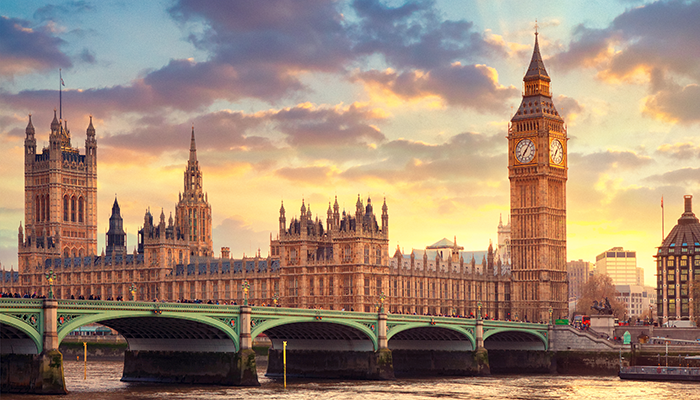
Image © iStock
According to the Institute for Fiscal Studies, there has been a “conspiracy of silence” over the difficulties faced by the incoming government.
The think-tank said earlier this month that neither the Conservatives nor Labour were serious about reducing national debt, suggesting both parties were dodging the harsh reality of spending cuts after the election.
Turning its intention to manifestos published this week, the IFS analyses how commitments made against a testing fiscal backdrop measure up to the public finance challenges ahead.
Conservative manifesto
The IFS expressed “a degree of scepticism” over how annual tax cuts of £17bn promised by the Conservatives would be funded.
According to the party’s manifesto, the reduction in taxes alongside a hike in defence spending would be paid for by cutting the projected welfare bill by £12bn, cracking down on tax avoidance and evasion, reducing civil service numbers and spending on management consultants, as well as “quango efficiencies”.
“Those are definite giveaways paid for by uncertain, unspecific and apparently victimless savings… forgive a degree of scepticism,” said IFS director Paul Johnson.
Delivering savings on welfare spending would be a “real challenge” given ballooning spend on health-related benefits and the fact that the number of new claims for disability benefits each month has doubled since 2019, he said – and the policies spelled out to date would not be enough to save £12bn.
The pledge to cut the main rate of National Insurance contributions from 8% to 6% and to abolish the main rate of self-employed NICs meant most workers would be paying less tax by the end of the next parliament than they would have been paying under an unreformed system, the think-tank said.
However, it noted that the manifesto was silent on where the £10bn to £20bn of cuts to spending on unprotected public services implied in the March Budget would come from.
The party was also “tying its hands” by promising not to increase the rates of income tax or VAT or to increase corporation tax, capital gains tax, stamp duty land tax or any tax on pension saving, it said.
It also criticised the Conservatives’ failure to commit to “essential and urgent reforms that should be at the top of any serious party’s to-do list”, notably council tax revaluation and, with petrol and diesel cars due to disappear from the roads, a plan for how to tax electric vehicles in the long run.
Labour manifesto
The public service spending increases promised by Labour are “tiny going on trivial”, according to the IFS, while the party’s planned tax rises are even more modest.
Beyond its biggest commitment – to a green prosperity plan costing less than £5bn a year to be funded by borrowing and a windfall tax on “the oil and gas giants” – there is little in the way of definite promises on spending.
One exception is health, where Labour has recommitted to the NHS workforce plan, to getting rid of all waiting times more than 18 weeks, and to more hospitals.
These promises could leave Labour with a problem, said the IFS.
“On current forecasts, and especially with an extra £17.5bn borrowing over five years to fund the green prosperity plan, this leaves literally no room – within the fiscal rule that Labour has signed up to – for any more spending than planned by the current government,” said Johnson.
“And those plans do involve cuts both to investment spending and to spending on unprotected public services.
“Yet Sir Keir Starmer effectively ruled out such cuts.
“How they will square the circle in government we do not know.”
The IFS welcomed the manifesto’s focus on economic growth and stability and said the party’s approach to planning and regulatory reform, as well as industrial strategy, looked broadly right.
A manifesto promising “a dizzying number of reviews and strategies” is better than a shopping list of half-baked policy announcements, said Johnson.
“But delivering genuine change will almost certainly also require putting actual resources on the table,” he said.
“And Labour’s manifesto offers no indication that there is a plan for where the money would come from to finance this.”
Liberal Democrat manifesto
The Liberal Democrats have set out a radical programme to boost public spending, directing additional resources targeted at health, education, defence and social security, with a series of commitments to be funded by significant tax increases.
The most significant increase in welfare benefits would be the abolition of the so-called “two child limit”, increasing entitlements by about £3,500 a year for low-income families with three children, and more for bigger families.
The IFS described the measure as a well-targeted way to reduce child poverty, saying it would be straightforward to implement, albeit at a cost of several billion pounds per year.
However, it warned that the Liberal Democrats’ spending plan could leave unprotected areas such as local government, prisons and the justice system to deliver billions more in cuts to their already shaky services.
It also questioned the feasibility of the party’s ideas for raising revenue, saying the prospect of raising £27bn a year from politically attractive sources such as banks, energy companies and frequent fliers was “extremely unlikely”.
“By focusing on taxing banks, energy companies and tech giants, many of these tax rises are intended to look ‘victimless’ - but of course they are not,” said Johnson.
“We are already raising more from taxing companies than at any time in decades.
“Moreover, there are clear risks that their package of tax measures would not raise the £27bn a year that they claim.”
On top of that, some of the tax raising measures put forward by the party were an “economically bad idea”, for example, the taxing of share buybacks, which the IFS said would distort companies’ financing decisions and further discourage the use of equity finance relative to debt finance.
Green Party manifesto
The vision set out by the Green Party would see the size of the state increase “on an unprecedented scale”, with a plan to increase taxes by over £170bn per year by the end of the next parliament to boost day-to-day public spending by £160bn and capital spending by £90bn.
The impact of the plan on borrowing would be significant, the IFS said.
“Even taking their figures at face value, overall borrowing would end up around £80bn a year higher and we could expect debt to be rising throughout the next parliament,” said Johnson.
Some of the Greens’ tax plans could yield substantial sums, he said, such as the increase in NICs for those earning over £50,000 and a planned restriction in pension tax reliefs.
He welcomed “sensible” measures such as plans to carry out a long-overdue council tax revaluation and to close inheritance tax loopholes, as well as attempts to tackle the challenge of taxing carbon emissions.
However, there were question marks over the likelihood of raising £90bn from a carbon tax, and windfall tax measures would only bring in temporary revenue, he warned.
Restricting upfront income tax relief on pension contributions would also be difficult to achieve - and could hit a lot of workers on relatively modest salaries, such as nurses and teachers.
“It is clear where the Green Party’s ambitions lie: a much bigger role for the state, better funded public services, and, of course, a swifter transition to net zero,” said Johnson.
“It is unlikely that the specific tax-raising measures they propose to help achieve all this would raise the sorts of sums they claim – and certainly not without real economic cost.”











